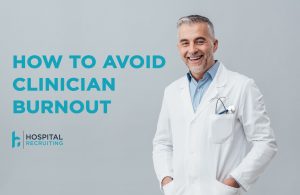Avoiding Burnout as a Clinician was originally published on HospitalRecruiting.

All clinicians have rough days; however, the stress and difficulty of providing clinical care can sometimes turn into something more. Burnout is a long-term stress that builds, emotionally depleting seasoned clinicians and making it difficult, or even impossible, for them to provide the quality of care they want to provide.
Effects of Burnout
Burnout has negative effects not only on clinicians but for their patients, their employers, and the colleagues that they work with. Some of the effects of burnout include:
- Medical errors – Mistakes are more likely to occur as a clinician experiences more burnout. Burnout decreases attention to one’s work, increasing the likelihood of medical errors.
- Poor outcomes – Decreased attentiveness to one’s work leads to poor quality work and an increased risk of mistakes. This ultimately affects the outcomes that patients experience.
- Higher costs – Because care provided by a clinician suffering from burnout can be of lower quality, it can result in care that is less efficient and more costly to the patient.
- Litigation risks – A lower quality of care combined with less empathy can be noticed by patients and their families, leading to an increased risk of litigation.
- Failure of interpersonal relationships – Burnout does not just affect a single individual; it can affect your relationships with other colleagues and your relationship with your employer.
- Mental health problems – Burnout is a form of emotional and physical fatigue that can lead to the development of mental health problems as it progresses.
Avoiding Burnout

Burnout can affect anyone, especially clinicians who are more experienced and have been exposed to the stresses of providing clinical care for a longer time. Here are some steps that you can take to avoid developing burnout.
Self-Reflection
Burnout isn’t like a traumatic injury, happing all at once. It is more like type 2 diabetes, a gradual condition that slowly develops over time. Because burnout has a gradual, slow onset, it is important to take the time to self-reflect from time to time, taking inventory of your emotional well-being.
There are many ways to self-reflect. Self-reflection can be something as simple as taking a walk by yourself once a week or spending time thinking about the past week and how you feel about it. You can also journal or spend time with colleagues outside of work, reflecting on how you are doing and how work is making you feel. Self-reflection will help you to recognize burnout before it becomes serious.
Self-Care
Clinical work is, at its core, an exercise in selflessness and giving of yourself to others. Constantly giving of yourself and your emotions is unsustainable if you are not also taking time for yourself. Caring for yourself rejuvenates you and prepares you to better care for others.
Many clinicians deprioritize self-care, not realizing that it affects more than just them. Elements of self-care can include taking time to exercise, getting adequate amounts of sleep, and taking time for activities that you enjoy and that don’t require you to spend time taking care of the needs of others.
Professional Support System
No one can survive indefinitely as a clinician by themselves. Providing clinical care is a team sport, and it is important to learn to rely on your team. No one understands the strains and emotional stresses that clinicians go through like other clinicians. Your colleagues have also gone through the emotional challenges of helping someone cope with imminent death, watching someone lose a child, or unsuccessfully trying to save a patient with whom they have developed a relationship.
Other clinicians have gone through what you are going through. Building relationships with these other clinicians and learning to talk about the stresses of your work can help provide an outlet for the difficult emotions that build up. Members of a professional support system can also help provide perspectives or strategies for avoiding burnout that they have found to be helpful.
Build Resilience
Building resilience can help you to avoid burnout but is difficult to do if burnout is already starting to set in. Focusing on learning and utilizing strategies for building resilience is a great way to proactively avoid or reduce burnout.
While building resilience can help prevent burnout, it is important to recognize that “pushing through it” does not work when burnout is starting to occur. If you are already starting to experience burnout, addressing it through other strategies is more important than building resilience.
Embrace a New Change
When burnout sets in, change can be necessary to reset and put things into perspective. For some people, a couple of weeks of vacation may be all that is needed. For others, taking a leave of absence or working in a new specialty may be what is necessary.
There is no shame in changing up your job for a few months to recoup from burnout. A new clinical job, or even a job in healthcare but away from the bedside for a few months can help you reach a better place and recover from burnout.
Burnout can seriously impact you and those around you. By taking steps to avoid burnout, recognizing when it develops, and addressing it correctly, you will reach the next level in maturing as a clinician and providing the care that your patients deserve.


